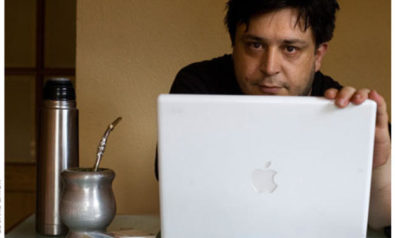
by Ivo Oliveira and Mithun Selvaratnam.
The crossroads of literature.
What do we talk about when we talk about literature? In the modern parlance, the term is associated with its academic context, referring to the enduring works of fiction, philosophy, history, etc. that have been studied for generations and shaped the foundations of our thought. Yet literature by its definition includes any and all written works, a fact that has never been more relevant than in our current Internet age, when the written word is more accessible and democratic than ever before.
The “death of print” has been much heralded over the past decade, precipitated by the rising accessibility of devices like tablets and smartphones that have made the electronic medium cheaper and more universal. Book sales, as well as magazine and newspaper subscriptions, have diminished, but our appetite for information has grown larger and more impetuous.
Major journalistic sources, which have always thrived off a mixture of concision and theatrics, have adapted to this shift. Twitter has created something of its own literary form, offering the use of hash tags to help convey a message within 160 characters. Blogs have afforded both individual writers and organizations, established or not, the opportunity of free publication. The hyper-textual nature of the Internet, aided by now ubiquitous social media, helps keep discussion flowing both around the world and around the clock. Online forums, which once belonged to a niche of dedicated computer enthusiasts, have been incorporated by most major news sites.
More “traditional” forms of literature, including novels, plays, and poetry, have been less successful in conforming to new technology. Various forms of “electronic literature,” including hypertext (interactive fiction), animated poetry, and even SMS (text-message) fiction have grown yet still exist within a small niche.
The dynamics commanded by the continuous change of technological progress, the incredible rate of advancement and the rapid shift of values which run pari passu with it, have kinesis as their key characteristic: a circulation of information and people where almost everything is dissolvable and dispensable.
But we have lost the optimism of the unifying potential of this kinesis. It has altered any notions of romanticism. Such a literary exercise is seen most in how authors have dealt with a post-9/11 world. Terrorism, clash and binding factors between civilizations or populist and cheap criticism have dominated these early years of the 21st century.
Science fiction, therefore, has been rising in all its glory. This is because the dialectic between the world and the materiality of language which “describes” it centers its attention on the multiple fragmentation of a cultural “I”. The actant and his metamorphoses, in parallel with technological advancement, become a decanted discourse. It fights against its obsolescence by swapping our economic and social fabric with the unfamiliar. This destiny has actually been weaved since the 1950s.
The rise of science fiction is not disconnected from what the Theatre of the Absurd had already implemented. Entangled between the boundaries of modernism and post-modernism, Camus’s concept of Absurd, Beckett and Ionesco, among others, depart from the promises of a better man, his axiomatic language, and run through existential discourses on his failure and consequent world view. Kerouac’s “Beat Generation”, along with William S. Burroughs, dealt precisely with the roots of this fragmentation.
Therefore, although literature has to change with society, authors are still trying to address immutable human questions in new ways and reconcile them with the ever-changing technology that surrounds us.
For more than 10 years, Fair Observer has been free, fair and independent. No billionaire owns us, no advertisers control us. We are a reader-supported nonprofit. Unlike many other publications, we keep our content free for readers regardless of where they live or whether they can afford to pay. We have no paywalls and no ads.
In the post-truth era of fake news, echo chambers and filter bubbles, we publish a plurality of perspectives from around the world. Anyone can publish with us, but everyone goes through a rigorous editorial process. So, you get fact-checked, well-reasoned content instead of noise.
We publish 2,500+ voices from 90+ countries. We also conduct education and training programs on subjects ranging from digital media and journalism to writing and critical thinking. This doesn’t come cheap. Servers, editors, trainers and web developers cost money.
Please consider supporting us on a regular basis as a recurring donor or a sustaining member.
Support Fair Observer
We rely on your support for our independence, diversity and quality.
Will you support FO’s journalism?
We rely on your support for our independence, diversity and quality.











